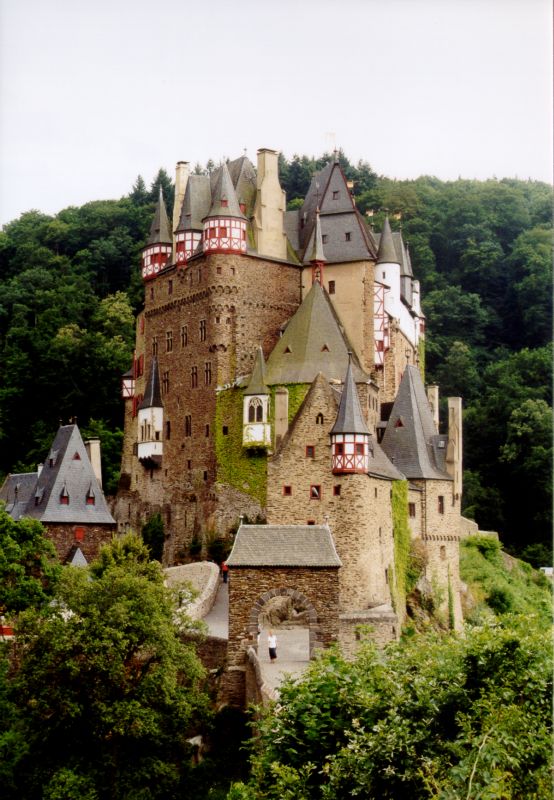Dark Lords, Dark Thrones
For the current story-game campaign, this is actually the core "hook" - the players are all old-school Red Box dungeon crawlers, but the setting is a semi-realistic 12th century Bavaria as seen through the lens of traditional ghost stories. The fairies aren't nice. The nobles aren't nice. No one is nice - this is survivalist RP. There are conflicting class levels and agendas in the party which means that there are different reactions to the same NPC. When the only absolutes are dogmatic, "dark" becomes universal (or irrelevant).
When I was digging through Blue Rose, I was looking at the setting as being ripe for subversion: the "good guys" in a pagan pro-gay pro-magic culture, the "ignorant guys" in an anti-magical monotheistic theocracy and the "bad guys" under the rule of a lich king and a scattering of outlanders of various stripe. There are personality traits, but no alignments in this system, so that's just another engine to do...
--The lich was a powerful ruler who had equally potent faith. His undead state is actually a divine blessing/commission to maintain the true "Old Ways" in the face of the revisionism of the other kingdoms.
--The system that the "good guys" use to determine rule - selection by a magical beast - isn't what it seems. The animals are actually manifestations of the antithesis of the Supreme Deity, subtly leading this kingdom into a state of perpetual war against the others. The "good gods" are also emanations of this "fallen one," appearing in a way that "makes sense to the wise" but is intrinsically absurdist.
--The "ignorant kingdom" follows their One True God, which is also an emanation of the "fallen one," but has become distorted by the priestly caste to serve their own ambitions. There are elements of the oldest traditions in their practices, but in general it's become degenerate and more pomp than power.
--Magic depletes the land and strengthens the "fallen one" every time it's used. What seems like raids by the "evil orcs" are actually tactical strikes by assault teams to destroy arcanists that are drawing too heavily on the land's mana.
There's more afoot, but since some of my players are on here...
In general, there's much mileage in the idea that people will do the most horrible things if they believe that it furthers "their people" in the end...
For the current story-game campaign, this is actually the core "hook" - the players are all old-school Red Box dungeon crawlers, but the setting is a semi-realistic 12th century Bavaria as seen through the lens of traditional ghost stories. The fairies aren't nice. The nobles aren't nice. No one is nice - this is survivalist RP. There are conflicting class levels and agendas in the party which means that there are different reactions to the same NPC. When the only absolutes are dogmatic, "dark" becomes universal (or irrelevant).
When I was digging through Blue Rose, I was looking at the setting as being ripe for subversion: the "good guys" in a pagan pro-gay pro-magic culture, the "ignorant guys" in an anti-magical monotheistic theocracy and the "bad guys" under the rule of a lich king and a scattering of outlanders of various stripe. There are personality traits, but no alignments in this system, so that's just another engine to do...
--The lich was a powerful ruler who had equally potent faith. His undead state is actually a divine blessing/commission to maintain the true "Old Ways" in the face of the revisionism of the other kingdoms.
--The system that the "good guys" use to determine rule - selection by a magical beast - isn't what it seems. The animals are actually manifestations of the antithesis of the Supreme Deity, subtly leading this kingdom into a state of perpetual war against the others. The "good gods" are also emanations of this "fallen one," appearing in a way that "makes sense to the wise" but is intrinsically absurdist.
--The "ignorant kingdom" follows their One True God, which is also an emanation of the "fallen one," but has become distorted by the priestly caste to serve their own ambitions. There are elements of the oldest traditions in their practices, but in general it's become degenerate and more pomp than power.
--Magic depletes the land and strengthens the "fallen one" every time it's used. What seems like raids by the "evil orcs" are actually tactical strikes by assault teams to destroy arcanists that are drawing too heavily on the land's mana.
There's more afoot, but since some of my players are on here...
In general, there's much mileage in the idea that people will do the most horrible things if they believe that it furthers "their people" in the end...




